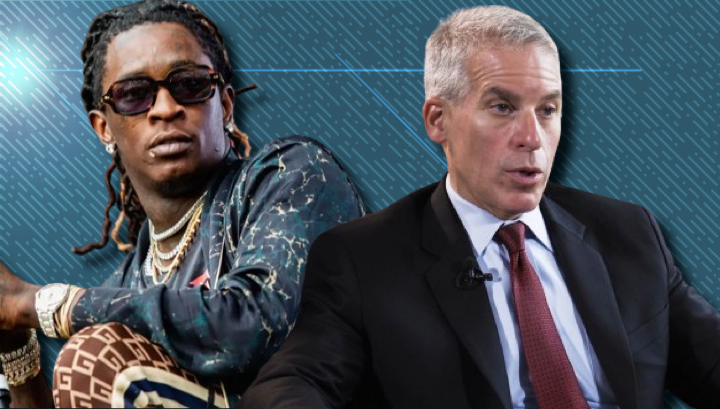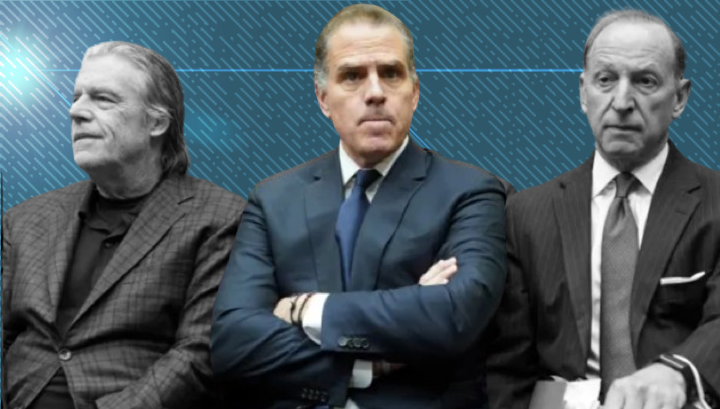Rapper Young Thug's lawyer, Brian Steel, was held in contempt of court after revealing Judge Ural Glanville, prosecutors, and a Georgia state star witness had been in private conversation prior to Monday's court proceedings.
The conversation reportedly took place in Glanville's chambers prior to Monday's court proceedings. Steel refused to divulge how he became aware of a private conversation between Glanville, prosecutors, and star witness Kenneth Copeland in the racketeering trial faced by Young Thug, the stage name of Jeffery Lamar Williams.
The attorney was escorted from the courtroom and sentenced to spend 20 days in Fulton County Jail, per Glanville's order. Steel was ordered to report to the Rice Street facility by 7 p.m. on Friday and will serve his jail sentence over the next ten weekends, per The Atlanta Journal-Constitution.
“How about the witness, how about Mr. Copeland, who supposedly announced that he’s not testifying and he’ll sit for two years and, supposedly this honorable court, or let me rephrase that, this court, said I can hold you until the end of this trial,” Steel said.
“You got some information you shouldn’t have gotten,” Glanville said.
“You’re not supposed to have communication with a witness who’s been sworn,” Steel retorted. “If that’s true what this is is coercion, witness intimidation, ex parte communications that we have a constitutional right to be present for."
Glanville then ordered Steel's removal from the court.
"Mr. Williams does not wish to be here without me," Steel told Glanville. "You are removing me against his will, my will, and you're taking away his right to counsel."
Steel then criticized Glanville for conducting material business of the trial without his presence, adding he couldn't learn about the trial online.
"For that reason, additionally I ask for mistrial," noting he did not expect the judge to grant his request. BREAKING: Young Thug’s lawyer, Brian Steel, was ordered into custody after he was held in contempt for not disclosing his source.
Steel's arrest followed the lawyer refusing to disclose the source of a private conversation between the judge, the DA, and a star witness.
“You got… pic.twitter.com/BHQuylP2kw
— Kyle Becker (@kylenabecker) June 10, 2024
"I deny your motion, but I'll certainly take that under advisement, sir," Glanville responded before calling the court into recess.
Young Thug's other attorney, Keith Adams, said he did not wish to continue proceedings without his co-counsel.
Steel's wife, Collette, who is also an attorney, filed a Notice of Appeal shortly after her husband was held in contempt of court.
"Notice is hereby given that Brian Steel hereby appeals to the Court of Appeals of Georgia from the Order of contempt on June 10, 2024, holding Brian Steel in criminal contempt," the appeal reads. NEW: Brian Steel’s wife, Collette Steel, has filed a Notice of Appeal regarding Judge Glanville’s order of contempt.
She will be representing him for the appeal. https://t.co/DrjTn69KgC pic.twitter.com/gvPNyzSiqA
— THUGGERDAILY ひ (@ThuggerDaily) June 10, 2024
Steel's wife also filed a Motion to Set Aside Contempt citing State of Georgia Bar Rule 1.6, Confidentiality of Information.
Her motion argued the court has imposed "illegal and inherently inconsistent punishment" for criminal contempt, and also asserts the court had involved itself in the proceedings.
"The court must recuse and allow these proceedings to be handled by a separate Court," the motion continues.
Young Thug is alleged to be involved in criminal street gangs responsible for crime including three homicides. The sprawling 56-count racketeering case naming 28 defendants was brought by Fulton County District Attorney Fani Willis.
Last November, Glanville ruled that the rapper's lyrics can be admissible as evidence. Defense attorneys have argued that the lyrics used in songs are constitutionally protected speech under the First Amendment. “They’re targeting the right to free speech,” Steel told the court at the time in a statement quoted by The New York Times. As the Times reported, prosecutors say they are not charging the rappers for the content in their lyrics but are simply using lyrics as supporting evidence that other crimes were committed and argued that they are not constitutionally protected speech. Prosecutors said, “The Defense would seem to opine that if the Unabomber’s manifesto had been set to music, it could not be used against him.”

